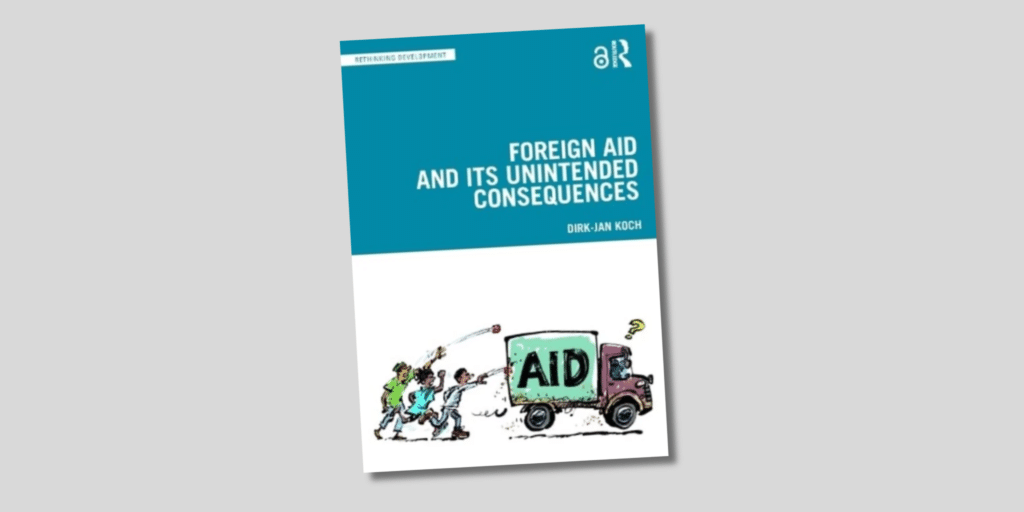In his new book, Professor Dirk-Jan Koch presents a new take on foreign aid: identifying unintended consequences, both negative and positive. A successful attempt, argues Bram van Leeuwen, but stronger systemic criticism is needed.
With the provocative title "Foreign Aid and its Unintenteded Consequences", Dirk-Jan Koch called on interested parties to delve into development cooperation on the basis of his 'critically-constructive' book. Indeed, a critical-constructive publication for good reason, because the author names failures and disappointments, next to fine successes that can be celebrated. And indeed: high time this call was heeded. After all, to the extent that any attention is paid to this subject, it is predominantly limited to the inner circle and then also only to haggle over quantity and budget pollution.
Koch aims to get policymakers, practitioners and evaluators to break taboos, see through tunnel visions and -yes- be self-critical. A successful attempt, it seems to me. Each chapter posits a clear thesis, the book addresses topical issues (including work in conflict zones, adverse effects, and sexual malpractice by aid workers) and makes more or less concrete conclusions and recommendations for each of its target audiences at the end of each chapter. This makes it almost impossible for those involved not to talk about this publication. Especially since Koch backs up his views with extensive research literature and illustrates them with numerous practical examples - not to mention his own wide and diverse experiences in many countries. Convincingly, he argues that careful planning combined with flexible execution, where the "eye on the ball" (i.e., on the goals set) should be kept constantly on the ball, lead to better results. All too often, his study convincingly demonstrates, those responsible for interventions are too often guided by externally imposed preconditions, assumptions and agreed planning.
The inviting writing style and presentation of this thorough research definitely help to read his findings as an encouragement to open debate. Not only does Dirk Jan regularly point to what could be achieved in our unruly world thanks to development aid, but also to the disastrous consequences of hiding away and doing nothing. The publication is thus a call to do better together, because we can! Hopefully, Dirk-Jan's call will work. I give a starter below.
Foreign aid is discussed within the current, familiar 'donor-recipient' framework. This framework remains squarely in place, although the author points out several times that the input of local actors is very important (see chapters 3, 10 and 13, among others). Everyone will agree with this. The problem, however, is that this point has been made for more than 4 decades and time and again in all kinds of evaluations, summits and policy documents is repeated. Respect for and importance of local actors recurs almost as a mantra everywhere - including in this book by Koch. But little changes in this area. Somewhat viciously, one might almost think that the many positive reactions to this publication are the result of this mild, non-committal recommendation to give more attention to local actors. It leaves the system untouched. So managers and policymakers can rest easy and once again organise many interesting conferences on questions of ''unitentended consequences' prevented. The widely shared awareness that representatives from the donor world have a limited understanding of the local context has only led to marginal adjustment of decision-making in the donor country. Illustrative of who is in charge in the sector is the title of BHOS' current policy: "Doing what the Netherlands is good at" (i.e. not primarily what they need). Nor do extremely complicated tomes of tender procedures erode the donor's dominant position. The 100-plus members of Partos (the trade association for development organisations) will have to translate the rhetoric about local actors into action: local actors in the 'driver's seat', not as co-drivers. Such a fundamental change is needed, but difficult within the existing frameworks set by the Dutch government for these organisations.
It would behoove the Netherlands - which became rich partly thanks to our colonial practices, as we are beginning to realise more clearly in recent times - to adopt a more modest stance when it comes to deciding on the use of resources for development cooperation. Leave local people in the driving seat when it comes to questions about the strategic use of resources to promote justice, fight poverty and improve the environment. Review could be limited to a few main lines: does cooperation in the short or longer term offer a) scope for civil society (after all, without civil society the chance of democratic processes is virtually excluded), b) improving governance (after all, sustainability is virtually hopeless without good governance, without functioning institutions), c) reducing poverty, and d) restoring the environment.
Too bad the last chapter is entitled: "it's the complexity, stupid". Rather, I would have preferred the "pracademic firebrand" (honorary title awarded to Koch by Prof. Bill Easterly) to have titled his final chapter: "it's the system, stupid". If Dirk-Jan had elaborated on this point, perhaps policymakers would quickly work out a simple new system in the next working conference instead of -if unitentended consequence of this book- organise a whole series of conferences and thick policy papers on the various complexities in the sector. Perhaps, Dirk-Jan, another book soon: you have knowledge and writing talents galore!
This is a submitted contribution. Would you also like to write a contribution for the Max van der Stoel Foundation? If so, please contact info@foundationmaxvanderstoel.nl.





